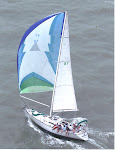First about the name--dismal. We found two explanations. All of 15th century colonist called any swamp dismal. The great expanse of wooded wetlands on the Virgina/North Carolina border was just the most dismal of all. That bit of information was courtesy of a pamphlet distributed by the NC Dept. of Highways. At the park headquarters we learned that William Byrd II, who surveyed the Virginia/NC border in 1728, called the area 'most dismal' and the name stuck. The swamp was the home of many run away slaves. Many of these came up the Pasquotank from Elizabeth City which held more abolitionists views than the typical Southern city.
The area has changed much since then. Every single tree has been logged or burned. Roads and canals have changed the water flow. The area is making a slow recovery under the care of the National Park Service. The Corp of Engineers administers the set of two locks.
White Pepper's trip through the canal was uneventful. We did not see much wildlife. The greenery was quite thick and right down to the waterline. It was much like driving through a long, straight and green corridor. The canal is too long to traverse in one day considering the locks only open four times per day and the last opening is at 3:30 pm. We stayed over night at the park head quarters with new friends and fellow Texans Bobbie and Jennie from Wandering Star.
The locks were fascinating. They raised and then lowered White Pepper eight feet. We were the only boat each time in the lock. After the northern lock we were in the southern branch of the Elizabeth River. Eventually, I do not see how the Dismal Swamp Canal can stay open. Few cruisers use the canal except during the great migration in October. Power boater avoid it because of floating logs. Bigger yachts can not use it because of depth concerns. White Pepper and Wandering Star were the only two yachts in the canal for the two days we were there. It's hard to see how the Corp of Engineers can justify the expense of the locks and dredging for so little traffic.
Saturday, August 9, 2008
Subscribe to:
Post Comments (Atom)

No comments:
Post a Comment